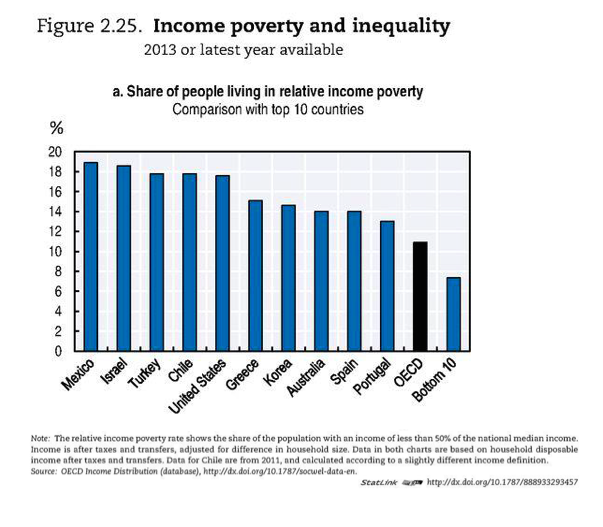Published: 9 February 2016
Last updated: 4 March 2024
In its Jan. 31 report, Israel scored #2 for biggest gap between rich and poor citizens. Only Mexico was found to have worse income inequality. But why is this? To find out, The Jewish Independent spoke with Joseph Zeira, an economics professor at Hebrew University in Jerusalem who studies wage inequality.
Israel’s large Arab and Haredi minorities have typically shown high rates of unemployment, but Zeira said that only partially explains the severe wealth imbalance in the Promised Land. ‘This is of course one of the reasons, but not the main one,’ he said.
The gap is due in large part to Israel’s meagre welfare spending. Since the 1990s, the country has cut back increasingly on public assistance. Zeira says his research has shown that one of the major reasons for high inequality in any country is a ‘small’ government which doesn’t spend a lot on welfare relative to gross domestic product (GDP).

‘The reason for that is the larger the size of government, the higher the taxes required to finance it,’ he told The Jewish Independent. Since most types of taxes -- whether income tax or corporate tax -- involve charging higher rates to higher earners, taxes effectively redistribute wealth among the population. This leads to less inequality.
So how does that apply to Israel? Over the past 20 years, Israel has experienced a drastic decline in public expenditure relative to its GDP, Zeira explained. Israel slashed welfare budgets in the early 2000s in order to encourage workforce participation. The budget cuts resulted in poverty levels rising in Israel over a number of years in the early and mid 2000s, the OECD report said.
Today, Israel’s richest citizens earn about 15 times more than its poorest, according to the OECD. The average for OECD countries is 9.6 times, significantly less than in Israel.
Yet tight-fistedness in public spending is only part of the reason for wealth disparity in Israel. The other factor at play is wage stagnation, according to Zeira. ‘While output per worker is rising continuously, wages (in real terms) did not rise since the beginning of the 2000s, for more than 15 years,’ he said. In other words, workers are more productive than ever but haven’t gotten a raise in almost two decades.
A result of this disconnect between wages and productivity is that the rate of profits earned by corporations and other big companies in Israel doubled between 2000 and 2013, from an average of eight percent to 16 percent. Zeira speculates that this is due to ‘a significant weakening of [organised] labor’ in Israel, including the decline of participation in unions.
High inequality in any society can be corrosive. ‘By not addressing inequality, governments are cutting into the social fabric of their countries and hurting their long-term economic growth,’ OECD Secretary General Angel Gurría said in May, the last time the organisation released a report showing that Israel had an abnormally big gap between its haves and have-nots.
For its part, the Netanyahu government claims it is taking action to combat this state of affairs. Israel Ministry of Finance spokesperson Chen Peretz told The Jewish Independent that the ministry is ‘taking many steps towards diminishing the poverty in Israel and dealing with the high costs of living.’ Peretz said, for example, that the most recent budget passed by the Knesset included NIS 2.6 billion (AUD 947,882 million) for child benefits, as well as large sums devoted to ‘employment guidance’ for welfare populations.
Will it be enough? With low inflation, rising employment and one of the strongest high-tech sectors in the world, Israel’s economy is booming. But that growth will inevitably be hindered if it excludes the country’s neediest. If left unchecked, income inequality can only add to the woes of the disadvantaged, while threatening the cohesion of a country that already suffers from perilous social divisions.
This The Jewish Independent article may be republished if acknowledged thus: “This article first appeared on www.thejewishindependent.com.au and is reprinted with permission."




Comments
No comments on this article yet. Be the first to add your thoughts.